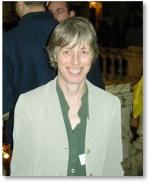
Mary Rees
Interview
From EWM Newsletter no. 16 (2010/1)
Professor Rees was born July 1953 in Cambridge (U.K.). She was brought up in Exeter in a mathematical fa-mily, the oldest of four girls, another of whom (Sarah) is now a mathe-matician working at Newcastle University.
Her first degree was a BA in Mathe-matics (Class 1) at St Hugh’s College Oxford in 1974, where she started the D.Phil. programme at Oxford, specialising in Functional Analysis. There, she completed two years, of which the first year was the M.Sc., before transferring to the Ph.D. at the University of Warwick, to work in Topological Dynamics with Prof. Bill Parry. Her Ph.D. was awarded in 1978.
After the Ph D came three years of post-docs, the first largely at IAS Princeton, but spending the summer at UC Berkeley, the second at St Hilda’s College Oxford on a Junior Research Fellowship, the third at I.H.E.S., near Paris.
Then, she went to University of Minnesota, Minneapolis, as an assistant professor, arriving at the start of 1982. Worked there for three years and was granted tenure after two years, but left in 1984 to work at the University of Liverpool, where she remains to this day.
Professor Rees research has all been in dynamical systems, concentrated on complex dynamics since the early 1980’s, when there was an upsurge in interest which has continued since that time. She also has a strong interest in, and has worked in, the closely related area of hyperbolic geometry. Her work has been recognised through the following awards: Junior Whitehead (LMS) prize 1986, sectional speaker at the ICM 1990, elected to the Royal Society in 2002.
E-mail: maryrees(at)liverpool.ac.uk
EWM: How did you come to be interested in Mathematics?
MR: To an outsider it is obvious: I come from a mathematical background. Both my parents taught mathematics at university. It was not so obvious to me, however, when I was growing up, the oldest of four girls, three of whom have degrees in mathematics, and two of whom are now professors of mathematics. My arithmetic is fast but not always accurate. „Sums” was definitely not my favourite subject at primary school, nor was I initially very keen on maths at secondary school. I had good teachers, though. The one who really fostered my interest in mathematics had a clear policy of setting the minimum of homework in order to get the point across. I really appreciated that because it meant I had the time to check my arithmetic and did not feel under pressure. I like to think that has influenced my teaching methods ever since but probably my students would disagree. When I was about 14 I realised that I liked the subject. This was a problem because I hated science (which was not well taught, apart from biology). I thought I would need to take more science at O-levels (which preceded GCSE’s) if I wanted to do mathematics at A-level. My mother told me that this was not necessary and that I could continue in the language stream, as I wanted. So I did, and then did English A-level along with two maths A-levels. Once I got to university I concentrated on doing Mathematics. There were uncertainties on the way to doing research, but not because I didn’t want to do it, more about the fierce competition. Anyone who manages to land an academic job feels lucky for ever after.
EWM: What is (approximately) the female/male ratio among the researchers that you encounter in your everyday activity?
MR: This question could be interpreted in several ways. There is now one other woman in Pure Mathematics in my department, out of 12 permanent staff in this area, and we have talked about research in general terms a bit, but most of our contact is on routine teaching matters. For the twenty five years that I have been teaching at Liverpool, there have always been between one and four other women on the permanent staff. We have a handful of women graduate students, in the department, currently one in Pure Mathematics, although another has just completed. I am not sure if „everyday activity“ should include email because I do not meet researchers in dynamics on a daily basis. I think the ratio of women in complex dynamics, internationally, is much higher than the one in ten I encounter in my work „every day“ . I have always found that I overestimate the number of women around. If I have a class test I count the number of women in the room (and also the number of left-handers) and always find it is less than I thought.
EWM: Did you know about the EWM before this interview? If yes, how did you find out about it?
MR: I have known about EWM for a long time. I THINK I have paid my latest dues but I remember it was quite tricky last time so I could be overdue with that. It is a while since I have attended any EWM conferences I am afraid, or even the local meetings.
EWM: In your opinion, how can a women’s organization such as EWM contribute better to the mathe-matical community at large?
MR: I do think that the meetings where researchers, especially younger women, talk about their work and their interests, are extremely valuable. I would certainly attend more of these if I had more time. Fostering the research of the young is the most important thing, especially for those of us who are beyond that stage. This is not necessarily a gender issue, but research is so tough, especially in the early years, that the more support can be given, the better.
